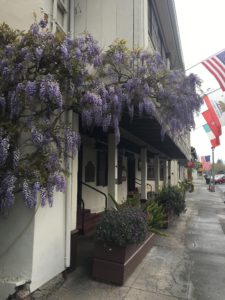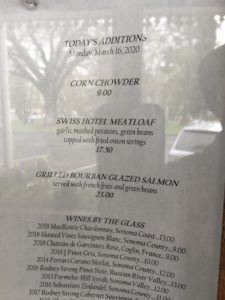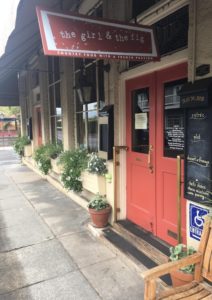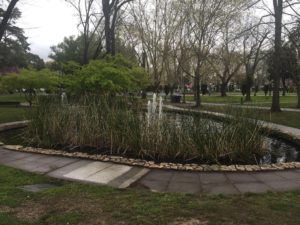THE DUCK POND
Pina walks to town as she has the last three days. It’s just a short stroll past the gorgeous stone building of Vella Cheese Company (still open), maker of a fabled dry Monterey Jack, past a horse farm where she counts them—six Clydesdales out grazing today. The rain has greened up the big yard. The horses strike her as marvelously mindless, but maybe they’re more locked into their place in time than she can imagine. She stops to watch them, the way their bodies shimmy with the current of life. She loves the feathery hair above their hooves. These massive creatures no longer do the hard work in the fields that they were bred for. Their only use is ceremonial now, pulling wagons for parades, and such. She pauses, briefly, to think about a world in which humans became irrelevant. The horses bunch together even as they graze, have little interest in separation, unlike the woman with the umbrella trundling in her direction, once Pina turns the corner. This woman, taking wide deliberate steps, looks like she’d weaponize her parasol to keep folks at their distance. Fortunately she crosses the street thirty yards ahead.

There are no more tourists in town, just a few cars, and fewer people. Past the old adobe Barracks and the defunct Cheese Factory, Mary’s, the homey pizza joint, has brought its outdoor tables in and offers takeout meals, between twelve and five. It’s noon and looks completely dead. Next door, The Swiss Hotel, Vince’s favorite place in town, is fully shuttered. Two days ago they still offered limited take-out. Vince feels like he’s won the lottery when he’s able to snag a table on the wide outdoor patio. There’s a choice view of the park and parade of tourists. Plenty of women for Vince to appreciate. Nobody today. She can almost hear Vince’s lament: When will they next serve a bowl of clams and mussels with sausage? Ah, just the basket of sourdough with the peppered olive oil.
Next corner, The Girl and the Fig, her favorite. Vince says it’s too hoity for its toity, but damn if it doesn’t have the most exquisite bar for eating. A Hendricks martini and a mushroom tartine to start. Yum. She loves the duck confit but is just as happy with a rare hamburger with grilled onions and frites. Sixteen bucks. Is that hoity toity? One winter night they shared the cassoulet at the bar. Vince relented, called the French beans soul food and asked her to make it. “Forget about it,” she said, “that would take days of cooking, and you have The Fig,” which now has a sober note of closure on the door addressed to the Fig Family. She’s never considered herself a member, but why not?


It’s the same with such closure notes all the way down the west side of the square, from Eldorado Hotel to the Sunflower Café, the Global Free Trade market, the great kitchen store, the boutiques and wine tasting rooms, the art gallery, the spa. She passes Steiners, the hard-drinking bar that’s been in place since 1927, and stops at the windows of the ancient menswear shop, Earlad’s, since 1922, which used to be the last place in town, as Vince told her, where a fella could get a cowboy shirt. There’s not one to be seen through the windows. No string ties either. Catering to the tourists, Earland’s offers lots of Hawaiian shirts.
Instead of turning to the south side of the square, she crosses to the duck pond. The time Vince brought her there, he said, “This is where you can witness rape in plain sight everyday.”
“What are you talking about?”
“Just wait.”
“What if I don’t want to wait?”
“Just watch the ducks.”
“What is this, Vince, going to a lynching?” She did in fact watch the ducks. It was late in the afternoon. There were seven or eight of them swimming around. It was calendar pastoral. She and Vince were on a bench ten feet from the pond. Vince started whistling, one of his damn jazz riffs that he can’t leave alone, and in a minute, maybe two, a mallard swooped down on a hen, clamped onto the poor duck’s throat, and started humping her. Did she just see what she saw? Fucking Vince. She pushed him; she wished she were able to push him off the bench. “Did you just incite that with your fucking whistling?”
“Come on, Pina. I’m not that powerful. It’s just nature playing out in front of us.”
“Is that why you come here?” she asked. “To incite that shit?”
Now, across the pond from the bench where she sat with Vince, she recognizes a man, with legs crossed, eating a sandwich. It takes a moment for her to place him. It’s Charlie, an acquaintance of Vince’s who lives in the complex. They’d had a glass of wine with Charlie at his condo, which, as she remembers, was filled with engaging art and red enamel furniture that looked like it came from China. They had a pleasant visit, sitting on Charlie’s deck where he had beautiful planters of roses and all sorts of citrus. Later, Vince waxed on about Charlie. It was a good story, which is why she remembers it. The guy grew a long droopy mustache and changed his name to Raoul when he moved up from L.A. Eventually he worked as a lead animator at Industrial Light & Magic, and retired with a big sailboat moored in Sausalito, not long after turning fifty. Once he retired he took his old name back and shaved his mustache.

Pina strolls around the pond and ten feet away, says, “Charlie?”
He looks up, blinking at the sun. “Yes, yes.” He doesn’t recognize her.
“Pina,” she says and is about to explain.
“Oh, yes, Vince’s wife. Nice to see you. Really nice to see you. Vince up here now?”
“No, I’m isolating from him here.”
“Oh, right, right. The poor man’s in the trenches. I worry about the doctors.”
She nods. Charlie is holding his half eaten sandwich in his hand. It looks like tuna. “I’m sorry to interrupt your lunch.”
“No, no. Sit. I think we’ll have a good six feet between us.”
It looks closer to five feet, but she sits. Living dangerously.
“Pina—that’s a beautiful name. Rare but beautiful.”
“It’s short for Crispina, which means curly-headed in Italian.” She doesn’t know why she’s volunteered this.
He gazes at her head and smiles. Yes, her hair is still wavy. She likes it, even the small wedges of gray that keep asserting themselves. White women who straighten their hair amuse her.
Charlie has slipped what’s left of his sandwich into his paper bag. In a knick of time, she stops herself from reaching to touch his arm, to tell him that he should keep eating. What’s the matter with her? In the middle of a plague she’s sitting on a bench with a strange man she’s about to touch.
“So you’re Italian?” he says.
“Yes, my parents came from Bergamo.”
“Ah, Bergamo. Beautiful city. I spent a few days there on the way to Lake Como.”
She looks into Charlie’s face, which is well tanned and, strangely, without lines across his high forehead. How can a man in his fifties be unmarked by age? She tries to imagine him with a droopy mustache and almost starts laughing.
“Matter of fact,” he says, “I’ve been thinking a lot about Bergamo. You know it’s become one of the epicenters of the virus?”
“Yes, I heard.”
“And your parents?”
“They’ve passed.”
“So sorry. Anyway, they’ve been dropping like flies in Bergamo. The mortality rate is brutal. They don’t even get a chance to bury their dead.”
Charlie has become emotional. He pulls a handkerchief from his pocket and pats his eyes. “I’m sorry,” he says, “sometimes it just gets the better of me.”
“I understand.”
“But Bergamo. Ah.” The laughing blue comes back into his eyes. “I take it you’ve been there.”
“Yes.” She thinks to tell him about her trips as a child, but stays silent.
“I was there at chestnut time,” he says, “and in the morning you’d see the old men going out with their sticks and their sacks to gather chestnuts, and, oh my, the bakery windows were stacked high with grand, marvelously colored macaroons. Cypress Umber. Red ochre. Vermillion. I mean colors a Renaissance painter would be proud to have in his palette.”
Charlie’s eyes are lit up with the colors he names.
“I’ve got to tell you, I had a very memorable meal in Bergamo. Little birds. They call them uccillini. Three of them came on the plate in a cognac sauce with polenta. They’re songbirds, really. You put the whole bird in your mouth at once. Crunch the tiny bones, the brain. Two three bites of flesh. Delicious. The only thing I didn’t eat was the feet. You’d think after eating three songbirds I’d be able to carry a tune.” He laughs at his little joke.
“Hmm,” she says, not knowing what else to say.
And then a blush of worry crosses Charlie’s face. His eyelids flicker and close. “I’m sorry.”
“For what?”
“I’m just sitting hear talking your ears off. Too much time alone, I guess. Forgive me.” He stands, grabs his paper sack.
Did she do something to offend him?
“Good to see you, Pina. Send my best to Vincent. Tell him I’m proud of him.”
What did she do? It all happened so fast. She watches him walk off. And then he surprises her again. “Pina,” he calls from a short distance. “I’m a creature of habit. That’s what this thing’s done to me. Anyway, I have my lunch here everyday at noon.”
She watches the ducks for a while, keeping a keen eye on the mallards. For now, they all circle seamlessly, their worlds, despite the paucity of visitors, far less changed than hers.
